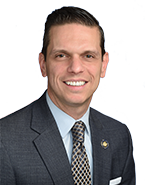Following New CDC Report, Assemblyman Santabarbara Urges Governor to Sign Bill Expanding Autism Resources
Assemblyman Angelo Santabarbara continues to urge Governor Kathy Hochul to sign legislation he co-sponsored that would create an autism detection, education and mapping program within the Autism Spectrum Disorders Advisory Board (A.1953). This comes after a recently published report by the Centers for Disease Control and Prevention (CDC) revealed that 1 in 44 children are now diagnosed with autism.
“The new data published by the CDC reiterates the fact that more needs to be done to support those living with disabilities,” Santabarbara said. “It’s crucial we expand and enhance the services we have in place to better understand its causes and advocate for the individuals and families it affects. The Autism Spectrum Disorders Advisory Board has proved to be an invaluable resource, especially in the wake of this pandemic, and building on its mission is more vital now than ever. In light of this report and today’s timely International Day of Persons with Disabilities, I’m once again calling on the governor to sign this bill into law so we can better address the unique challenges people with disabilities face at different stages of life and promote awareness and education to help these individuals, their families, caretakers and the community thrive.”
This month, the CDC released its biennial update on the prevalence and characteristics of autism spectrum disorder among children across the nation. The data, which was collected in 2018, found that 1 in 44 8-year-old children, or about 2.3%, were diagnosed with autism.[1] This is a significant increase from the CDC’s 2016 study, which found that 1 in 54 8-year-old children were diagnosed with autism.[2]
Santabarbara, whose son was diagnosed with autism at the age of 3, has spearheaded numerous laws to help those in the disability community, including creating the Autism Spectrum Disorders Advisory Board in 2016. This board is composed of individuals with autism, professionals in the field and relevant state agencies who work together to provide people with autism and their families with support and access to resources (Ch.469 of 2016). Once signed into law, this new bill would create an autism detection, education and mapping program within the Board to promote early detection of autism. The measure would also help educate the public, provide counseling and referral services and map locations of occurrences of autism. The CDC data highlights the need to strengthen the role of this Board and invest in autism research and resources, and this bill is a step in the right direction toward fulfilling these goals, Santabarbara noted.
